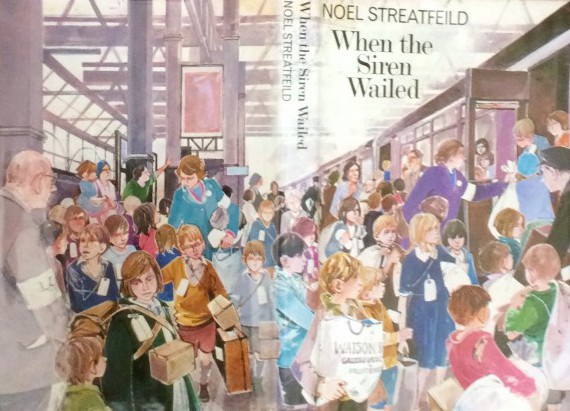Inspiring Young Readers
 posted on 25 Feb 2016
posted on 25 Feb 2016
When the Siren Wailed by Noel Streatfeild
I have always been interested in stories about Second World War evacuees, partly because my father was one. He often used to reminisce about his initial homesickness followed by a period of real delight in living in the countryside - an experience that probably gave him a lifelong appreciation of nature. Streatfeild worked with evacuees in London and this makes the story feel authentic. She has often written about children whose separation from family has had an impact on their childhood, some positively and some less so. She does not shield her child readers from uncomfortable realities and presents protagonists who are stoical in the face of adversity and pretty self reliant. Her biography indicates that she was this kind of child herself, one who enjoyed her own company and liked to question authority. She therefore portrays the children very sympathetically whilst her adult characters feel rather less rounded, possibly because she views them as being less important and interesting.
The story begins with a glimpse of the disruption to ordinary lives caused by rumours of war. I particularly liked the trip to the Town Hall to be fitted with very uncomfortable gas masks that needed to be carried at all times. She notes that the children's Mickey Mouse masks designed to be 'fun' were actually very sinister.
After several practices, the real evacuation takes place. It still seems remarkable that the mass movement of children from London in 1939 known as 'Operation Pied Piper', was successfully orchestrated by central government and thought to be a good temporary solution for removing children from danger. The logistics of moving them all by train under relatively scant adult supervision and then efficiently dispersing them into new homes throughout the country was impressive. This story is a good example of how one family of three children stick together, overcome initial difficulties and adapt remarkably well to their new lives. The scrabbling together of very limited resources by the parents in preparation for the adventure highlights the poverty of the 1930s - threadbare clothes and no bags to put possessions in is quite shocking to read about. Streatfeild had had first hand experience of the lives of families like this when she worked in the slums as part of The Deptford Voluntary Childcare Committee between the wars.
The noisy and uncomfortable train journey to Dorset with little boys constantly fighting, the grumpiness of the put upon hosts of the grubby, tired evacuees and the practical unsentimentality of allocating children is vividly described - I felt as exhausted as they were by the end of their long journey. When they arrive it seems that the two brothers, Andy and Tim might be separated from their sister, Laura but this is resolved by the kindness of Mr and Mrs Elk, servants to the formal but ultimately kindly Colonel Launcelot Stranger Stranger. The children soon get used to their new more ordered and affluent way of life but all this changes when the Colonel dies and they need to be moved to another home.
What struck me was how fickle children can be in terms of their affections, Tim the youngest child very quickly adapts to his temporary family and although the children are forced to write a letter home each week - they don't seem to be all that bothered by a years separation from their parents. We learn that their mother, Elsie, works in a munitions factory ( based on another of the author's experiences) and their father, Nobby, has joined the Navy
Without going into too much detail, the children are concerned about moving to another home and so decide to return to London to find their mother - only to discover that their house in London has been destroyed in the blitz and their mother is recovering from a head injury in hospital. The bleak starkness of the bombed city is described very well as Streatfeild is very good at evoking urban landscapes.
Although there is a lot of interesting detail about the contrasts between rural and country life and the effects of war on a family of young children, it feels rather flat in terms of plot and characterisation. The eventual resolution of events feels rather clumsy and frankly unbelievable. I don't think that it stands up to the much more gritty evacuee story ' Goodnight Mr Tom' by Michelle Magorian or the more endearing 'Carries War ' by Nina Bawden. Perhaps is is a bit too old fashioned in spirit as Streatfeild comes across as just a little bit too patronising for my taste. There is an implied criticism of the working class parents but also an overriding ' poor but happy' theme. It would be interesting to see whether young readers today would enjoy it.
Karen Argent
22nd February 2016